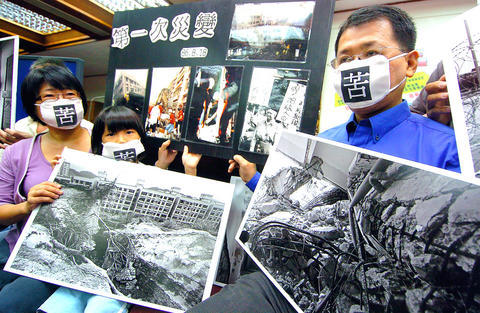Exactly 10 years after part of the Lincoln Mansions (林肯大郡) complex was destroyed during a typhoon, the community still sits in ruins with promises of help remaining unfulfilled.
It was 10 years ago today that heavy rain brought by Typhoon Winnie caused the retaining wall of the Lincoln Mansions complex in Sijhih (汐止), Taipei County, to collapse.
Twenty-eight residents were killed in the incident, as the collapsed wall released a torrent of mud and rocks that flattened their apartments and forced another 500 families to abandon their destroyed homes.

PHOTO: LIAO CHEN-HUEI, TAIPEI TIMES
The survivors were just too scared to live in the complex after learning that it had been built on land at risk of subsidence.
"Time stopped at the moment of the tragedy 10 years ago at Lincoln Mansions," Chinese Nationalist Party (KMT) Legislator Joanna Lei (雷倩) told a press conference at the Legislative Yuan yesterday.
A black-and-white picture taken last month by former resident Chou Chi-chuan (周志全) shows a giant piece of rock filling the window of an apartment, with mud spread all over the floor.
In another picture, an inclined building stands on ground that has cracked open.
"These pictures were taken last month, not 10 years ago, but there's not much change," Chou said.
"The people who should have been held responsible for the tragedy are still free as birds, and the promises of help were never fulfilled," Chou said.
"The owner of the construction company, Li Chung-hsien (李宗賢), has yet to be sanctioned," said a former resident surnamed Lai who lost his wife in the accident.
Li, who obtained the construction permit illegally, was sentenced to 10 years in prison in the first round of the case, Lai said.
However, the sentence was later changed to four years and "the case is still in appeal today," Lai said.
Li also reached a separate settlement out of court with residents in which he promised to "take care of mortgage issues for us, but never did," Lai said.
In addition, promises made by Democratic Progressive Party vice-presidential candidate Su Tseng-chang (蘇貞昌) when he was Taipei County commissioner and President Chen Shui-bian (陳水扁) when he was running for the presidency in 1999 to "handle the issue as a special case" were never fulfilled, Chou said.
In the news conference, former residents asked the government to preserve the ruins of the community as an example of inappropriate development.
In addition, they also demanded that the government release a piece of land for them to reconstruct their community, and that the government set up standard operating procedures for similar disasters in the future.
Teng Min-chi (鄧民治), executive secretary of the county administration said the county would help the residents but did not offer any concrete promises.

A preclearance service to facilitate entry for people traveling to select airports in Japan would be available from Thursday next week to Feb. 25 at Taiwan Taoyuan International Airport, Taoyuan International Airport Corp (TIAC) said on Tuesday. The service was first made available to Taiwanese travelers throughout the winter vacation of 2024 and during the Lunar New Year holiday. In addition to flights to the Japanese cities of Hakodate, Asahikawa, Akita, Sendai, Niigata, Okayama, Takamatsu, Kumamoto and Kagoshima, the service would be available to travelers to Kobe and Oita. The service can be accessed by passengers of 15 flight routes operated by

Alain Robert, known as the "French Spider-Man," praised Alex Honnold as exceptionally well-prepared after the US climber completed a free solo ascent of Taipei 101 yesterday. Robert said Honnold's ascent of the 508m-tall skyscraper in just more than one-and-a-half hours without using safety ropes or equipment was a remarkable achievement. "This is my life," he said in an interview conducted in French, adding that he liked the feeling of being "on the edge of danger." The 63-year-old Frenchman climbed Taipei 101 using ropes in December 2004, taking about four hours to reach the top. On a one-to-10 scale of difficulty, Robert said Taipei 101

Taiwanese and US defense groups are collaborating to introduce deployable, semi-autonomous manufacturing systems for drones and components in a boost to the nation’s supply chain resilience. Taiwan’s G-Tech Optroelectronics Corp subsidiary GTOC and the US’ Aerkomm Inc on Friday announced an agreement with fellow US-based Firestorm Lab to adopt the latter’s xCell, a technology featuring 3D printers fitted in 6.1m container units. The systems enable aerial platforms and parts to be produced in high volumes from dispersed nodes capable of rapid redeployment, to minimize the risk of enemy strikes and to meet field requirements, they said. Firestorm chief technology officer Ian Muceus said

MORE FALL: An investigation into one of Xi’s key cronies, part of a broader ‘anti-corruption’ drive, indicates that he might have a deep distrust in the military, an expert said China’s latest military purge underscores systemic risks in its shift from collective leadership to sole rule under Chinese President Xi Jinping (習近平), and could disrupt its chain of command and military capabilities, a national security official said yesterday. If decisionmaking within the Chinese Communist Party has become “irrational” under one-man rule, the Taiwan Strait and the regional situation must be approached with extreme caution, given unforeseen risks, they added. The anonymous official made the remarks as China’s Central Military Commission Vice Chairman Zhang Youxia (張又俠) and Joint Staff Department Chief of Staff Liu Zhenli (劉振立) were reportedly being investigated for suspected “serious